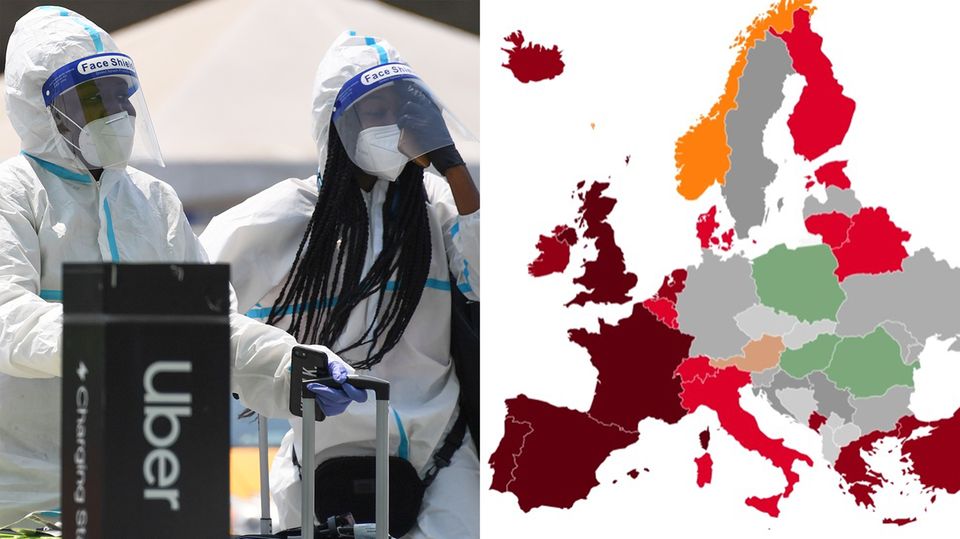The month-long lockdown with homeschooling, closed schools, mask requirements and contact restrictions will not remain without a trace. With the planned return to face-to-face teaching, experts expect that children and young people will catch up with infections.
Children get sick more often from infections – several infections per year are not uncommon. But in the pandemic with homeschooling and daycare centers that were closed at times, with masks, contact restrictions and distances, not only was the coronavirus pushed back: A number of other diseases also occurred less often than usual. The Robert Koch Institute (RKI) in Berlin, for example, recorded very low numbers of other acute respiratory infections. A flu wave did not even build up in the past season.
Potential disruptive factors for school operations
With the planned return to more normalcy with attendance at schools this autumn and winter, however, experts expect that children and young people will catch up with infections. In addition to the feared corona increase, especially in these often unvaccinated groups, there are likely to be some colds and flu. “Since you first have to think about Corona when you have a cough and fever, you have to go into quarantine to be on the safe side and wait for the test result, this is likely to be a major disruptive factor for school operations,” the Secretary General of the German Society for Immunology, Carsten Watzl, expects like him the German press agency said.
After the end of lockdowns in several states, including parts of the USA and Israel, an increase in diseases caused by the respiratory syncytial virus (RS virus) has already been reported. The common cold usually gets around mainly in the winter months, but now spreads in the warmer seasons. “Children go back to school, see friends and have normal lives again, and these viruses take revenge,” the Jerusalem Post newspaper quoted a medical professional in June.
Children catch up on missed infections
Pediatricians in Germany registered colds caused by the RS virus so far in the summer “a little more,” said the spokesman for the professional association of paediatricians, Jakob Maske, of the German press agency. “We see it relatively calmly.” Children caught up with the infections that they would have missed during the Corona period. “The RS virus is a normal cold pathogen that one would normally not look for. The risk it poses is not comparable to that of corona or flu,” he said. The specific groups for which the virus poses a risk include extremely premature babies and previously ill newborns, for whom there is, however, the possibility of prevention with an administration of antibodies.
In an autumn-winter strategy, the RKI writes that an additional number of children and adolescents can now be assumed who are susceptible to acute respiratory infections. This could lead to a shift in seasonal waves of illness “as well as to a larger number and possibly also an increase in serious illnesses”. Prevention and care options for influenza, RSV diseases and pneumonia, especially in children and in the elderly, should be prepared, according to the RKI.
How to distinguish a runny nose from corona?
It is normal and positive to see that children go through infections, said the Berlin pediatrician Mask. “We will certainly see more slight forms of it in the next few months. The main difficulty will be to differentiate between the runny nose and whether it is corona or a common cold.” For parents this will also mean some anger and uncertainty again. “But we’ll do that again.”
Do infections in children now threaten to be more difficult after the Corona period because the immune system is less trained? Immunologist Watzl assumes more diseases, but not necessarily more severe courses. “You shouldn’t think of the immune system as a muscle that has regressed in the pandemic.” It also had enough to do with the measures to protect against corona, for example because germs are not only absorbed with the air we breathe, but also with the food.
Higher numbers of cold coronaviruses and the RS virus
Depending on the pathogen, there are different reasons for catching them, explains the immunologist: “You get rhinoviruses, for example, because the virus is constantly changing and thus appears new to the immune system. It is not due to a lack of experience.” With the normal cold coronaviruses and the RS virus, one is simply due again after a certain time. With such infections, “more people are now” back on the line “because many did not get their immunity last season,” explains Watzl. “One can therefore expect a higher number than normal for these infections. For the rhinoviruses, for example, I am not assuming a higher number.”
Mental stress on children due to isolation worse than Corona
Even despite the feared spread of corona among children and adolescents, pediatrician mask believes that there is no alternative to returning to face-to-face classes with hygiene measures and testing. “Children are a relatively safe group. They usually do not fall ill if they are infected with corona. This also applies to the new virus variants,” said Maske. We do not yet know enough about the extent of long-term consequences, known as long covid. “However, so far we have seen far more negative consequences of isolation and pandemic measures in children and adolescents than of Corona and Long Covid.” Several studies showed mainly psychological stress.

For Pediatrician Mask there is no question: daycare centers and schools should definitely stay open even if the incidence increases, he appeals. After the hard cuts for these groups in the past few months, solidarity with them is required. “Adults have to be vaccinated against Covid-19 to protect their children, not the other way around,” said Maske. He backed the Standing Vaccination Commission (Stiko), which so far only recommends corona vaccination for previously ill children aged twelve and over: “It is unbelievable that some politicians are now recommending vaccinations for children.”




